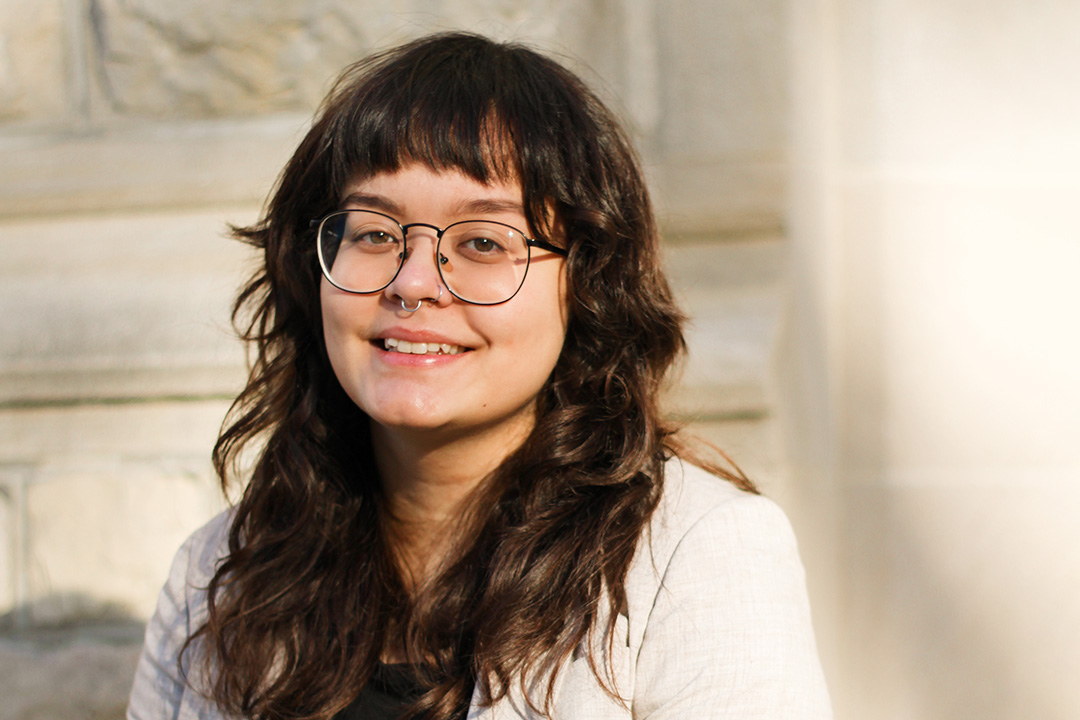
USask English student named College of Arts and Science’s most distinguished graduate
Hannah Tran will receive the Haslam Medal and the Copland Prize in Humanities during Spring Convocation
By Shannon BoklaschukWhen Hannah Tran graduated from the University of Saskatchewan (USask) in 2021 with an honours degree in psychology, she knew her undergraduate journey wasn’t over.
A love of writing and literature inspired Tran to return to USask’s College of Arts and Science to complete a second degree. As a result, during Spring Convocation in June, she will receive a Bachelor of Arts degree in English with great distinction.
“When I finished my psychology degree, I just didn’t feel ready to leave literature behind—and there were so many classes left that I never got a chance to take,” she said.
Tran was encouraged by many professors over the years to pursue a degree in English, so it “almost felt inevitable” to do so, she said, adding that she “found a home in literature.”
“The best part of the English program is how supportive the professors are,” she said. “I’ve been able to personally connect with almost all of my professors in the department, and they have all been incredibly supportive and encouraging of my pursuits. It’s wonderful to find a department where you genuinely feel like your voice is heard.”
Tran is ending her undergraduate studies on a high note as the College of Arts and Science’s most outstanding graduate. She will receive several top prizes during a college awards ceremony on June 6, including the Copland Prize in Humanities—awarded at Spring Convocation to the top graduate in the humanities—and the Award for Excellence in English Studies. She is also this year’s recipient of the Haslam Medal, awarded annually to the most distinguished graduate receiving a four-year or honours degree from the College of Arts and Science.
When asked about her advice for academic success, Tran noted that being an outstanding student “does not have a singular definition.”
“We all come from different backgrounds and places, and we cannot hold ourselves to the same standards as everyone else. My advice is to remember your own strengths and to give yourself credit where it is due. You’re doing the best you can with the resources you have and that’s enough,” she said.
Prior to beginning her studies at USask, Tran completed high school at Evan Hardy Collegiate in Saskatoon. At USask she earned numerous scholarships and awards and was included on the Dean’s Honour List, which acknowledges individuals whose academic grades rank in the top five per cent of those studying with a full course load in the college.
As a USask student volunteer, Tran served as editor-in-chief of in medias res, a student-led literary magazine at St. Thomas More College, and as an associate editor for USURJ, the University of Saskatchewan Undergraduate Research Journal. She was also an executive member of Menstruation REDefined USask, as well as a volunteer at the University of Saskatchewan Students’ Union Women’s Centre, a research volunteer at the Saskatchewan Equity, Equality, and Diversity Laboratory, and a volunteer notetaker through Access and Equity Services.
Tran’s paid positions included employment as a writing tutor for the Writing Help Centre in the University Library, as well as serving as editor-in-chief for The Sheaf student newspaper, and working as a research assistant in two psychology labs. This fall, she will attend York University to pursue a master’s degree in psychology. Her research focus will be on social categorization and discrimination.
Tran said that, as a student coming from multiple marginalized backgrounds, she has come to recognize how important it is to have diverse voices represented in all facets of academia and how important it is to actively work to elevate those voices.
“One of the most important things to me across my entire academic career has been to make people question and appreciate the diversity in their lives. As an English student, I think it’s incredibly important that we read literature coming from different people and places. I always go out of my way to recommend that folks read authors of colour, authors from non-Western countries, and literature by women,” she said.
“Beyond that, I want to stress how important it is for us to carve out those spaces in our own universities. I’ve worked on multiple ventures this year trying to do that, which ranged from developing the Writing Centre’s first workshop on anti-racist writing to actively developing policies in the student publications I worked in, to encourage work by diverse voices and about diverse issues. No matter our discipline, we can all do our part.”

